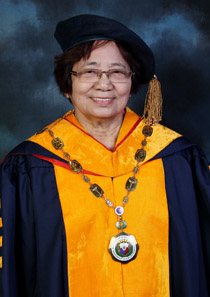
The University of the Philippines is a state university system in the Philippines. It is the country's national university, as mandated by Republic Act No. 9500, giving it institutional autonomy.

The University of the Philippines Los Baños, also referred to as UP Los Baños or colloquially as Elbi, is a public research university primarily located in the towns of Los Baños and Bay in the province of Laguna, some 65 kilometers southeast of Manila. It traces its roots to the UP College of Agriculture (UPCA), which was founded in 1909 by the American colonial government to promote agricultural education and research in the Philippines. American botanist Edwin Copeland served as its first dean. UPLB was formally established in 1972 following the union of UPCA with four other Los Baños and Diliman-based University of the Philippines (UP) units.
In Philippine folk culture, lihí is a condition of pregnancy food craving. A notable characteristic is that pregnant women usually desire food such as sour, unripe mango with bagoong. While it is a cultural concept restricted among Filipinos, analogous cultural phenomena of pregnancy food cravings have been observed in various cultures. It is still debatable whether lihí can be classified and established as either a biological or psychological condition or a purely social and cultural one.

The University of the Philippines Manila is a public, coeducational, research university located in Ermita, Manila, Philippines. It is known for being the country's center of excellence in the health sciences, including health professional education, training, and research. It is the oldest of eight constituent universities of the University of the Philippines System, and predates the founding of UP by three years. It was originally established on December 1, 1905, as the Philippine Medical School and later renamed as the UP College of Medicine and Surgery on June 10, 1907. In 1983 it was renamed as University of the Philippines Manila.

The Philippine Heart Center is a hospital in Central, Quezon City, Philippines, specializing in the treatment of heart ailments. It was established on February 14, 1975.

The Cultural Center of the Philippines Foundation, Inc. is a government-owned and controlled corporation established to preserve, develop and promote arts and culture in the Philippines. The CCP was established through Executive Order No. 30 s. 1966 by President Ferdinand Marcos. Although an independent institution of the Philippine government, it receives an annual subsidy and is placed under the National Commission for Culture and the Arts for purposes of policy coordination. The CCP is headed by an 11-member Board of Trustees, currently headed by Chairman Dr. Jaime C. Laya. Its current president is Kaye C. Tinga.
Gina Pareño is a Filipino actress. She is referred to as the "Queen of Philippine Melodrama", being best known for her award-winning portrayals in films like Kubrador, Serbis and Kasal, Kasali, Kasalo.

Guanidinoacetate methyltransferase deficiency is an autosomal recessive cerebral creatine deficiency that primarily affects the nervous system and muscles. It is the first described disorder of creatine metabolism, and results from deficient activity of guanidinoacetate methyltransferase, an enzyme involved in the synthesis of creatine. Clinically, affected individuals most commonly present with developmental delay, behavior disorder, and seizures. Diagnosis can be suspected on clinical findings, and confirmed by specific biochemical tests, brain magnetic resonance spectroscopy, or genetic testing. Biallelic pathogenic variants in the GAMT gene are the underlying cause of the disorder. After GAMT deficiency is diagnosed, it can be treated by dietary adjustments, including supplementation with creatine. Treatment is highly effective if started early in life. If treatment is started late, it cannot reverse brain damage which has already taken place. The prevalence of GAMT deficiency is estimated to be 1:250,000.

Fe Villanueva del Mundo,, was a Filipino pediatrician. She founded the first pediatric hospital in the Philippines and is known for shaping the modern child healthcare system in the Philippines. Her pioneering work in pediatrics in the Philippines while in active medical practice spanned eight decades. She gained international recognition, including the Ramon Magsaysay Award for Public Service in 1977. In 1980, she was conferred the rank and title of National Scientist of the Philippines, and in 2010, she was conferred the Order of Lakandula. She was the first female president of the Philippine Pediatric Society and the first woman to be named National Scientist of the Philippines in 1980. She was also the founder and the first president of the Philippine Pediatric Society, the first Asian to be elected president of the Philippine Medical Association in its 65-years existence, and the first Asian to be voted president of the Medical Woman's International Association.

The Order of National Scientists of the Philippines, abbreviated as ONS, is the highest award accorded to Filipino scientists by the Philippine government. Members of the order are known as National Scientists.

The University of the Philippines Manila - School of Health Sciences in Leyte is a medical school in the Philippines supervised by the University of the Philippines, Manila. One of the schools offerings includes midwifery.

Krista Elyse Hidalgo Sullivan, better known by her stage name Bela Padilla, is a Filipino actress, host, singer, writer, and director.

Kathryn Chandria Manuel Bernardo is a Filipino actress. She began her career as a child actress, portraying young versions of lead characters in series such as It Might Be You (2003) and Endless Love (2010). She gained prominence in the 2010 remake of Mara Clara and has since established herself as one of the most popular and successful actors of the 21st century in the Philippines.

Daniel John Elago Ford, known professionally as Daniel Padilla, is a Filipino actor and singer. He is a recipient of multiple accolades across television, film, and music, including the FAMAS Award for Best Actor and PMPC Star Award for Movie Actor of the Year, as well as three World Music Awards nominations.
The Presidential Medal of Merit is an honor given by the Republic of the Philippines.

Perla Dizon Santos Ocampo, MD ONS was a Filipina pediatrician.

Charis Eng was a Singaporean American physician-scientist and geneticist at the Cleveland Clinic, notable for identifying the PTEN gene. She was the chairwoman and founding director of the Genomic Medicine Institute of the Cleveland Clinic, founding director and attending clinical cancer geneticist of the institute's clinical component, the Center for Personalized Genetic Healthcare, and professor and vice chairwoman of the Department of Genetics and Genome Sciences at Case Western Reserve University School of Medicine.

Maid in Malacañang is a 2022 Filipino period drama film written and directed by Darryl Yap. The film is a fictional retelling of the Marcos family's last three days in Malacañang Palace before they were forced to be exiled to Hawaii during the People Power Revolution in 1986. The film stars Cesar Montano, Cristine Reyes, Diego Loyzaga, Ella Cruz and Ruffa Gutierrez as the Marcos family, alongside Karla Estrada, Elizabeth Oropesa and Beverly Salviejo.

Dolores A. Ramirez is a Filipino geneticist. She specializes in plant breeding and plant cytogenetics. She was named a National Scientist of the Philippines in 1998.
Charlotte Martinez Chiong is a Filipino otolaryngologist with a subspecialty in neurotology, focusing on hearing health, cochlear implants, and neurotological skull base surgery based in Malolos and Manila, Philippines. She is best known for her research on children's implantable hearing devices, which built the foundation for the Republic Act No. 9709 of the Philippines that organized a universal screening program for hearing loss in newborns.
















